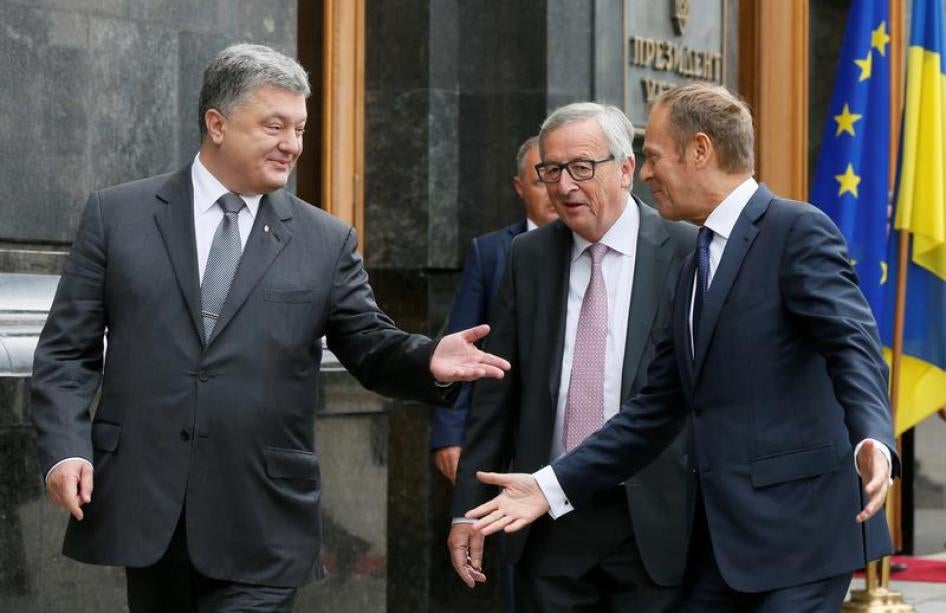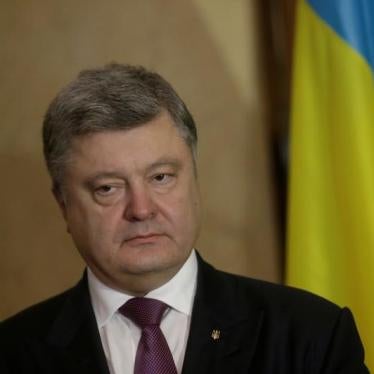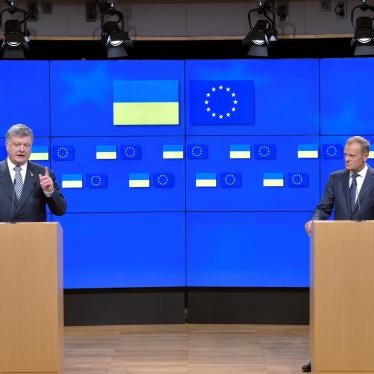Ukraine is moving to undo a March 2017 law that imposed an excessive burden on anti-corruption activists to publicly report their income and assets. That's good.
But it will instead require NGOs to prepare extensive, onerous public reports about their funding and financial activities - which is bad.
The European Union, and governments in the G7 club of wealthy nations, should urge Ukraine to drop these proposals for heavy-handed punitive regulations.
These measures were set out in deeply flawed bills, introduced by Ukraine's presidential administration to parliament in July, requiring organisations to publicise such information as payments made to certain staff, consultants, and service providers, including the recipients' names.
Any group that failed to file its reports on time would lose its non-profit status, effectively putting a stop to its work.
If adopted, rather than enhancing accountability, these bills would hamper the work of NGOs and threaten legitimate privacy interests of non-profits and the people they work with.
The bills are inconsistent with guidelines and recommendations developed by the Council of Europe in Strasbourg and the Organisation for Security and Cooperation in Europe (OSCE) in Vienna.
There is considerable misunderstanding and even purposeful misinformation about the draft laws as well as about what legitimate requirements may be imposed on groups operating in the developed democracies of the G7.
The measures' supporters in Kiev cite the annual tax report that many non-profits in the US must submit, as proof that the proposed requirements in the draft laws are similar to regulations for non-governmental groups in other democracies.
But the US law sets a considerably higher threshold for an annual budget before the reporting requirements are triggered. Groups also have three years to correct errors, rather than face an immediate loss of non-profit status.
Ukraine's international partners should dispel these myths and share information about how their governments support and enable the flourishing of non-governmental groups and activists.
G7 countries that provide substantial assistance to Ukraine had rightfully insisted on sweeping reforms and transparency by Ukrainian officials - demands that led to requirements for public officials to submit income and asset declarations.
The news that some parliamentarians and other officials actually had fantastic wealth both confirmed citizens' suspicions and led to significant resentment by the officials forced to reveal details of their lifestyles.
These officials struck back at the anti-corruption activists by requiring - in the law passed in March - that they too submit income and asset declarations.
Revenge
Some members of parliament publicly admitted that revenge was a key motive.
The March bill was even framed in such a way that it could impose criminal penalties on activists who were unable or refused to submit the same detailed income declarations required of government officials.
The proposed draft laws removing this requirement, however, would impose onerous and unnecessary requirements on non-governmental organisations.
They would undermine the numerous Ukrainian groups that support people displaced by the conflict in eastern Ukraine and Russia's occupation of Crimea, fight for human rights, work with local government authorities to improve their operations, and reform the country's healthcare system - efforts in which G7 donors have heavily invested.
European and other G7 countries that have strongly supported anti-corruption reforms have a special responsibility to press Ukraine's government to reverse their course because of their investments in democracy in Ukraine - and because their own rules and laws for NGO groups are being manipulated in Ukraine to justify harsh new measures.
The G7 governments and their ambassadors in Kiev should immediately urge the Ukrainian government and parliament to drop these proposed new requirements and take seriously their responsibility to protect, rather than hinder, independent groups operating in Ukraine.
Ukrainian leaders should recast their regulations based on standards established by the Council of Europe and OSCE as guidelines.
Ukraine should steer clear of excessive regulations and find ways of supporting the work of these non-governmental groups.
All proposals affecting these groups should be thoroughly considered through broad and open consultation.
One need not look any further than Russia and Kazakhstan to see how over-regulating civil society might start out looking benign, but then takes on a life of its own and becomes almost impossible to reverse.
The G7 can and should prevent this from happening in Ukraine.









